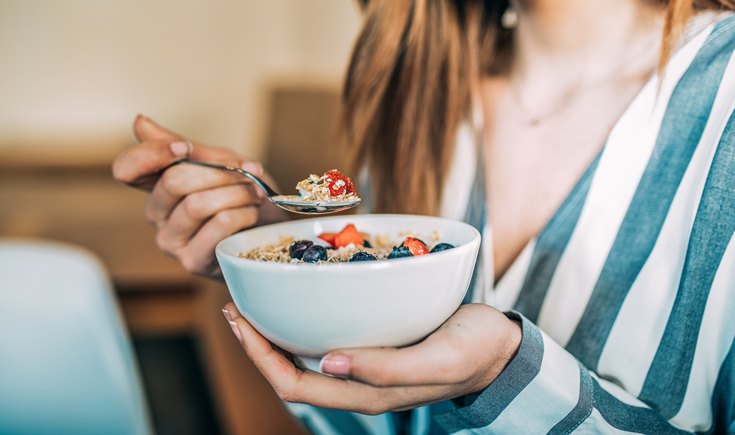

If you’re trying to get pregnant, did you know that eating a healthy diet can maximise your fertility chances? Including the right foods in your diet not only improves your health, vitality, and egg quality, but it also helps to give your baby the best start.
Here’s our list of fertility-boosting foods (for both women and men) to add to your diet now, with some ideas on how to incorporate them into each meal.
What to eat when you’re trying to get pregnant:
Fruits and vegetables
Load up at least half of your plate with a wide variety of fruit and veggies every day and at each meal.
Breakfast: Eat plenty of citrus fruits and berries, or make a green smoothie.
Lunch: Enjoy a big leafy salad.
Dinner: Eat a rainbow!
Fats
Foods containing essential fatty acids are important for the development of a baby’s brain and eyes. Include different healthy oils, nuts, seeds, and certain oily fish to your diet. These foods are also high in other essential nutrients, like zinc.
Breakfast: Sprinkle ground flax seeds on your yoghurt, or add nuts to your smoothie.
Lunch: Drizzle olive oil and add pumpkin seeds to your leafy salad. Avocados are a fertility superfood for both men and women, so enjoy them often.
Dinner: Eat 2-3 portions of fish per week (limiting fish high in mercury, such as swordfish, shark, and tuna to one portion a week).
Complex carbohydrates
Increase your brown and wholegrain carbohydrates, while removing the refined white foods that are nutrient-void and quick to digest. Complex carbohydrates, as well as not spiking your blood sugar, also contain fertility-friendly nutrients such as vitamin B, vitamin E, and magnesium.
Breakfast: Eat rolled oats, rather than highly processed cereals.
Lunch: If you like sandwiches, choose wholegrain or wholemeal bread.
Dinner: Brown rice and wholegrain pasta are great, wholesome options.
Protein
As well as fish, you can include some chicken, turkey, pork, and beef trimmed of fat. They’re all great sources of protein, zinc, and iron—all important building blocks for a healthy pregnancy.
However, when choosing protein for fertility, many nutritionists recommend opting for plant protein, such as beans, legumes, nuts, and seeds. These foods contain phytoestrogens, which help to balance hormones. Eggs are another excellent source of protein and choline, which is a vitamin that helps develop brain function in babies.
Breakfast: Omelette loaded with veggies.
Lunch: Hummus with veggie sticks.
Dinner: Lentil bolognese with wholegrain pasta.
Important nutrients to increase fertility for both women and men:
- Folic acid and B vitamins from a wholefood diet are essential for DNA production.
- Zinc, found in fish and meat is essential for utilising the sex hormones of both men and women.
- Selenium can improve sperm quality, and protect against miscarriage and birth defects. Brazil nuts are a great source of selenium.
- Essential fatty acids (from nuts, seeds, fish) play a role in hormone production in women and semen in men.
- Vitamin E can increase fertilisation rates by making sperm more fertile, and improving the quality of your eggs. Include avocado, nuts, and seeds for this vitamin.
- Vitamin C, found in many fruits, decreases the risk of miscarriage and improves sperm quality.
- L-carnitine (found in avocado) is vital for the normal functioning of sperm.
- L-arginine is an amino acid also vital for sperm production can be found in meat.
- Vitamin A, taken as beta carotene, is vital for a healthy pregnancy. Orange vegetables such as sweet potato contain good levels.
Getting sufficient nutrients through food alone can be hard
Even with the best intentions, it can be difficult to meet all of these increased nutritional needs. You might consider taking a supplement to increase your chances of getting pregnant.
Preconception and stage one supplements, which are recommended for use from two months prior to conception, contain Folic Acid, Iron, Iodine and Calcium – all crucial during those early stages.
Foods to cut down or avoid when you’re trying to get pregnant
- Drink coffee, tea and alcohol in moderation, and avoid sugary drinks entirely.
- Avoid forms of processed soy, particularly protein powders and energy bars.
- Cut down sugar levels, and stick to less-processed sweeteners.























